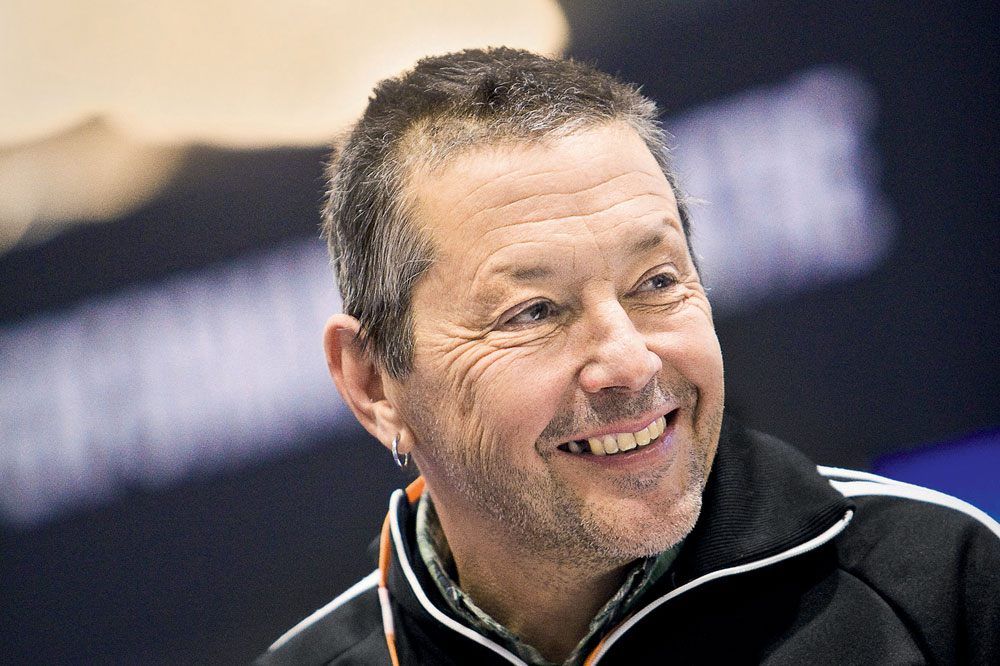Keith Bontrager: Frame builder, mountain bike pioneer & component designer

Frame builder, mountain bike pioneer, component, wheel and tyre designer, consultant with Trek Bicycle and a hell of a cook, Keith Bontrager has been at the pointy end of the bike industry for over 30 years.
A former motocross racer who also tuned engines, Bontrager started building road frames in the late 1970s. He then made some of the earliest mountain bike frames before he sold his company to Trek in 1995, who also hired him as a parts designer and consultant.
But Bontrager, now an absurdly youthful looking 59-year-old with a range of experience that is unique in the bike industry, actually started out as a physicist, gaining a degree in the subject from the University of Santa Cruz.
“Physics gives you a framework to understand things in more or less fundamental ways, and compared to the sort of b******t explanations that are available to explain why things happen the way they do on a bicycle,” says Bontrager, who has toiled at the interface between theory, practice, engineering, mass production and marketing for almost all of his working life.
“You can look at things, at explanations and say, ‘No, that’s not right.’ You can’t always explain precisely what’s happening but it gives you a solid start point and you can refine it from there. Physics gives you the understanding that enables you to throw out a lot of the lore that has built up around bicycles,” Bontrager added.
“If you have done your homework right, you really do understand, at a reasonable level, what’s happening and why, to a bike or wheel or whatever. Funnily enough, very early on I used to work for Geoff Fox [of Fox shocks] and he had a PhD in theoretical physics and he demonstrated that to me over and over again.”
Breaking convention
Get The Leadout Newsletter
The latest race content, interviews, features, reviews and expert buying guides, direct to your inbox!
Bontrager’s background and approach wasn’t always a comfortable fit in the hide-bound bike industry of the early 1980s.
“Back then, if you TIG-welded a road frame people thought you were from the moon and it took the arrival of mountain bikes before you were allowed to do anything different — that’s when the orthodoxies of the day started to crumble,” Bontrager observed.
“I think a lot of theory around road bikes was starting to quiver around that time, but when mountain bike ideas and technology started to be applied, the industry changed and it was like, ‘OK, the old rules are done’. I’d say from that point, road bikes went from making incrementally small changes to far more radical approaches, almost like a do-what-you-want ethos. Mountain bikes injected a big dose of innovation into road bikes.”
There may have been misfires (Beryllium and metal matrix composites) and some developments were based more on fashion than function. But the use of materials like highly manipulated aluminium, and design that originated in mountain biking, fed back into a moribund road bike industry.
“Once it was demonstrated that aluminium and carbon worked in mountain bikes, it just turned into the wild, wild west — which was mostly a good thing,” Bontrager laughed. For a man who made his name initially, by making bombproof, gusseted steel mountain bike frames, Bontrager is remarkably sanguine about the ‘steel is real’ lobby. “For the most part, I’m not that emotional about bicycles and I’m not moved in that way about bikes,” he said.
“I like well-done, crafty old bikes, but I’m not sure I would use the same adjectives about them, in the end I just like seeing nicely-done, well made, handmade things — it can be a table, it can be a bike, whatever. But I also like riding the latest carbon fibre bikes — from a sheer, sensational point of view riding these bikes is unlike anything I’ve ridden in the past, and it’s awesome. “Riding a stiff, 15-pound good handling bike is a really, really beautiful thing, it’s such a joy. If I could have made that out of steel, then I would have, in a second, but I couldn’t, it’s not possible, it’s never going to happen because of the limits of the materials.
Time to refine
“Interestingly, we’ve come so far in the space race now with high-end road bikes, there’s such a clear delineation between those bikes and the hand-built steel bikes, that it opens up possibilities for steel bikes that are beautiful in their own way.”
However, is there a sense that the explosion of creativity that was ushered in by the mountain bike revolution is now slowing?
“Oh, the bike industry reached a plateau in terms of major improvements possibly ten years ago,” Bontrager stated. “I think what we are doing now is making small refinements to the ideas we had 10 or 15 years ago and as you refine those, the bikes get better.
“But if you looked at the ‘big picture’ performance of a bike that will be made next year compared to one made five years ago, if you could somehow find a way to measure performance, I think you’d find they were pretty similar.
“It’s inevitable that in the world we live in, with the commercial constraints and realties, that after a steep improvement curve that things will flatten out because of the nature of the materials and technologies. For example, we could maybe lighten a wheelset a little, but it has to be able to cope with different levels of abuse by riders of different weights. We don’t know the weight of the rider who is going to use our wheels, so we have to pull back a bit and be cautious.”

So what about the future? Could it be cyclo-cross bikes? Yes, according to Bontrager, it could. “OK, we’re not really Belgian enough,” he said, “but if I only had to keep one bike, it would probably be my cyclo-cross bike.
“You can do everything on one — ride off-road trails, tour and, if you put in some road wheels, it rolls just about as fast — though the roadies will never agree!”

Thank you for reading 20 articles this month* Join now for unlimited access
Enjoy your first month for just £1 / $1 / €1
*Read 5 free articles per month without a subscription

Join now for unlimited access
Try first month for just £1 / $1 / €1
-
 'The line was 5 metres too far' - Tadej Pogačar reacts to Amstel Gold Race second place
'The line was 5 metres too far' - Tadej Pogačar reacts to Amstel Gold Race second placeWorld champion reeled back and beaten in sprint by Lidl-Trek's Mattias Skjelmose
By Tom Davidson
-
 'I was riding for the podium' - Mattias Skjelmose pulls off shock Amstel Gold Race win after reeling back Tadej Pogačar attack
'I was riding for the podium' - Mattias Skjelmose pulls off shock Amstel Gold Race win after reeling back Tadej Pogačar attackDane worked with Remco Evenepoel to set up stunning three-way finale
By Tom Davidson